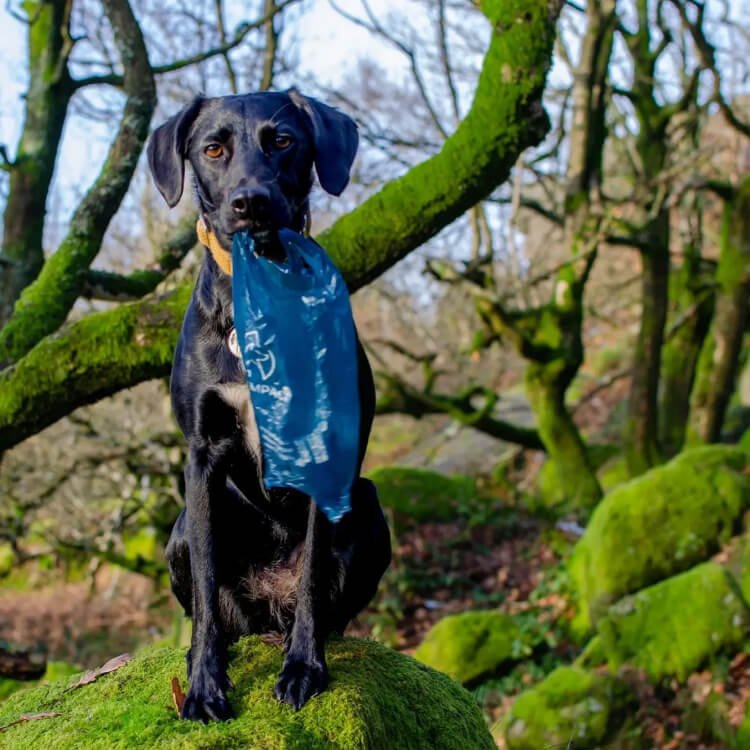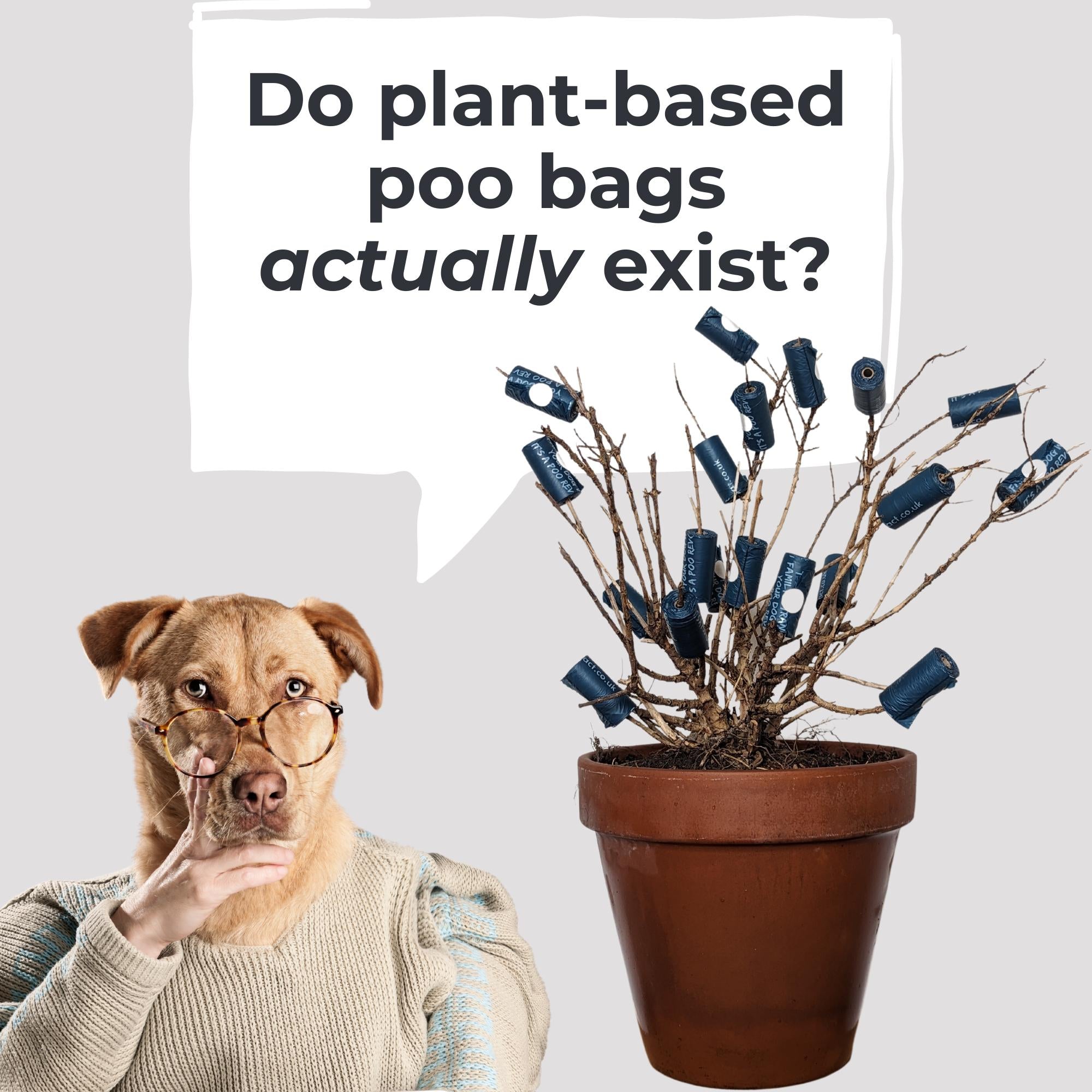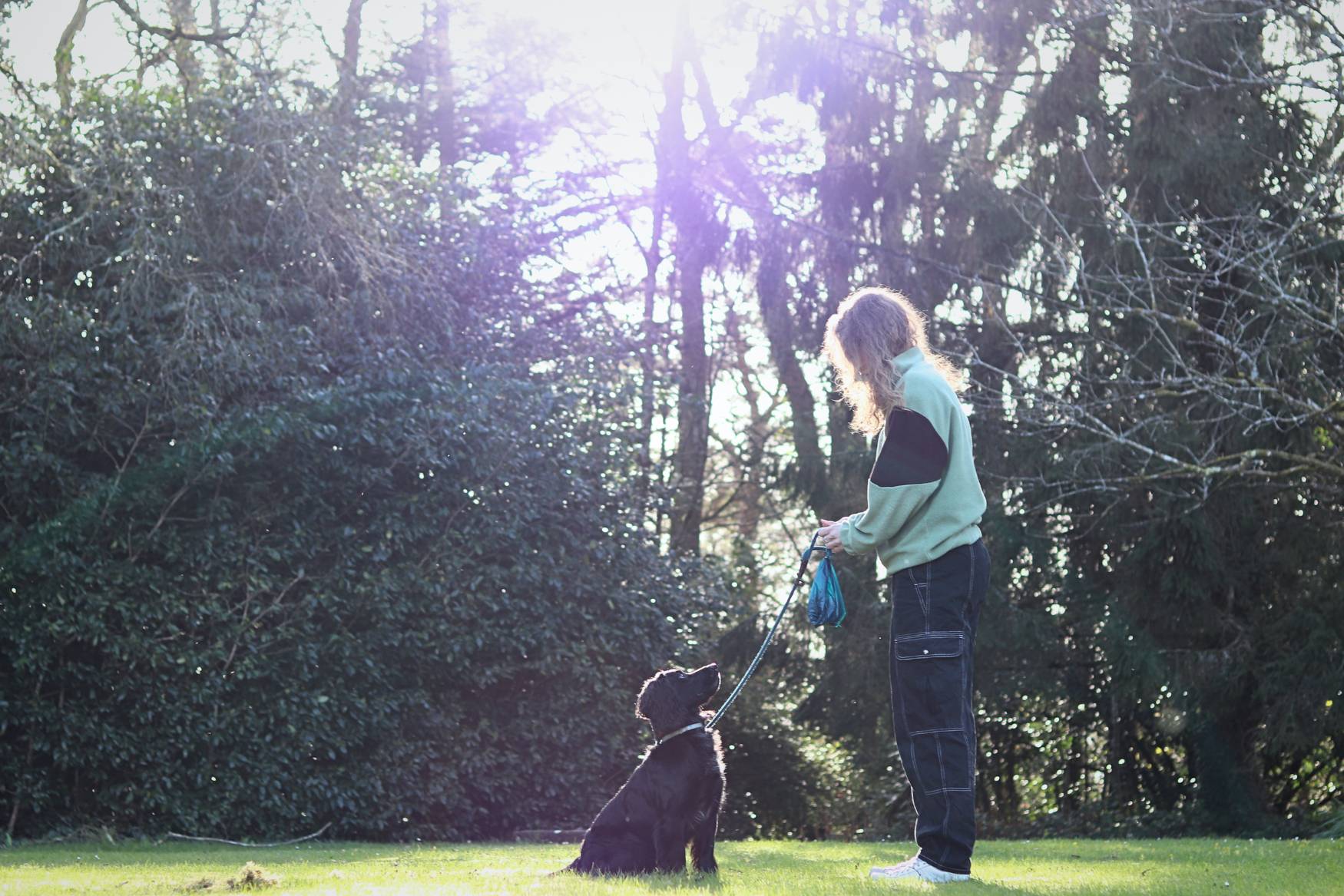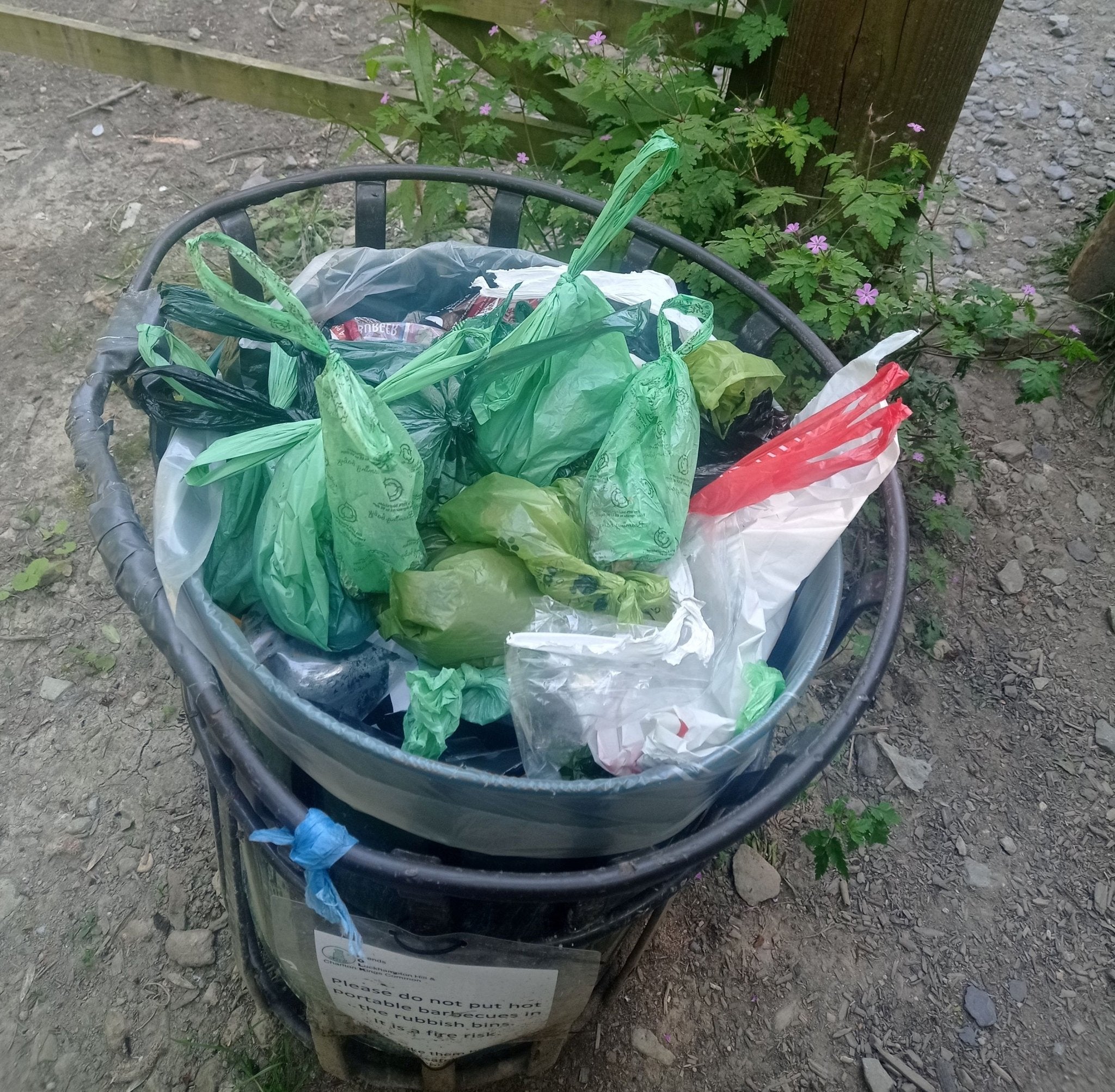‘Compostable, biodegradable, oxo-biodegradable, degradable and bioplastics’….. you’re not the only one who is confused!
Unfortunately, these similar and confusing terms are often used interchangeably (and incorrectly) to make a product appear more ‘eco-friendly’.
So, before reaching for the green poo bags (because green must mean they are eco-friendly right..?) Please familiarize yourself with the meaning of these terms to call out greenwashing and help protect our planet!
If the following is too much to read, we have condensed the “take home points” at the end of this page.
Before we dive in, it is useful to first consider how plastic is made because the resources used have important environmental consequences. Conventional plastic (e.g. PVC or polyethene) is made from fossil-fuel derivatives (e.g. oil or gas) so are sometimes called ‘fossil-based’. Fossil fuels are non-renewable and release carbon dioxide and are therefore destructive to our planet. Thankfully, plastic can also be made from renewable biomass resources (e.g. plants such as corn-starch, straw or sugarcane) and are therefore sometimes called ‘bio-based’. Plants are renewable and absorb carbon dioxide and release oxygen, so are generally more favourable resources. It is also worth noting that some plastics are made from a mix of both plants and fossil fuels!
Bioplastic
Watch out! This term is often used interchangeably with other terms, such as biodegradability and bio-based.
Bioplastics are a large family of plastics which can be either bio-based (made from plants) or biodegradable or both (….I mean seriously, could it get more confusing?)
So just because the term ‘bioplastic’ or ‘bio-based’ are used to describe a product – it does not necessarily mean that it is made from plants or that it biodegrades quickly and safely; it can be one or the other or both!
Plastic
Until recently, conventional plastic dog poo bags have been the norm. Currently 4% of landfill is filled with dog poo – all encased in plastic. Conventional plastic is made from fossil-fuel derivatives (fossil-based). It will eventually degrade via the action of sunlight, water and heat into tiny plastic fragments called microplastics. This process can take hundreds of years! There is now evidence that there are microplastics in the food we eat, the air we breathe and the water we drink. Furthermore, dog poo in landfill is not ideal because it can eventually leak nitrogen and pathogens (e.g. bacteria and parasites) into watercourses, hurting plant and aquatic life.
Degradable
Simply put, degradable plastic is one that fragments into ever smaller pieces. This is different from bio-degradation, which is conversion or 'digestion’ by microbes (e.g. fungi or bacteria) into organic biomass, followed by assimilation safely back into the environment. The problem is that manufacturers rarely state how quickly products ‘degrade’, under what conditions, whether the end-products are safe for the environment and there are no independent standards to test their claims.
‘Oxo-degradable’, ‘oxo-biodegradable’, ‘oxo-fragmentable’ are typically terms to describe normal plastic with chemical additives (including heavy metals). These additives make it fragment into smaller pieces at a rapid rate in the presence of oxygen, thereby contributing to microplastic pollution. Due to a lack of pass/fail criteria, the US standard ASTM D6954 for oxo-degradability has been deemed wholly inadequate and therefore there are currently no internationally accepted standard to prove the success of oxo-biodegradation. Over 150 companies and experts from the plastics industry and environment protection have voiced serious concerns about oxo-biodegradable products. These types of bags are now banned in the EU and will hopefully disappear from circulation completely.
Biodegradable
Biodegradable plastics can be fossil-based, bio-based or a mix of both. They are designed to be metabolized by microbes into non-plastic waste such as carbon dioxide, water and biomass. However, the rate and extent of this break down are highly dependent on specific environmental conditions, which may be different for different biodegradable products. Therefore claiming biodegradability without outlining the specific conditions it requires and the time-frame in which it happens is misleading. In fact, California has criminalised the use of misleading terms like “biodegradable” or “degradable" on plastic products due to their ambiguity. Research has shown that a lot of biodegradable plastic does not actually biodegrade outside of the lab environment and will persist in the ocean just like normal plastic.
Okay but most biodegradable poo bags end up in landfill, so what happens to them there? Unfortunately, biodegradable plastic requires oxygen to breakdown and landfill is so densely packed with rubbish it is effectively oxygen-free (anaerobic). Therefore, it is unlikely these plastic bags will biodegrade (experiments have found no change in the appearance of compostable plastics after 12 months in landfill) and if they ever do, they will release methane, 25 times as potent as carbon dioxide.
Last but certainly not least, there are no widely recognized standards or certification for ‘biodegradability’, so claims made by manufacturers cannot be verified or proven by a third party.
Industrially compostable plastic
Compostable plastics can be fossil-based, bio-based or a mix of both, just like other biodegradable plastics. Unless otherwise specified, compostable plastic must be sent to an industrial composting facility or anaerobic digestion plant with subsequent composting. Industrially compostable plastics will not compost in semi-controlled home composters or the natural environment because they require highly controlled conditions (e.g. temperatures of up to 60 degrees and constant mixing).
Both biodegradable and compostable plastic are designed to be digested by microbes into organic waste. However, compostable plastic requires human intervention to facilitate the process and the end-product is compost which can be used to enrich the soil, thereby nourishing the earth instead of polluting it! Therefore, by default all compostable plastics are biodegradable, but not all biodegradable plastics are compostable...
Importantly, there are international standards for compostability and certification by recognised and trusted third-party organisations. These tests require that compostable plastics do not leave any toxic residue and that 90% of it must biodegrades within 6-12 months.
Labels for properly certified industrially compostable products are, the Seedling logo, OK Compost INDUSTRIAL , and DIN-Gerprüft Industrial Compostable, as well as the compostable logo of Consorzio Italiano Compostatori (CIC). If they claim compostability without these logos then compostability cannot be guaranteed!

Sadly, while industrially compostable plastic potentially offers a fantastic solution to dog waste, the infrastructure is yet to catch up. There are very few industrial composting facilities in the UK and no industrial composting facilities currently accept dog waste (to our current knowledge). So these poo bags must be disposed of in general waste (i.e. incineration or landfill). In landfill they behave similarly to plastic with the added problem of producing methane, a potent greenhouse has.
What's more, many industrial composting facilities do not want compostable plastic because they find that in reality, it doesn't compost quickly enough. It is also also argued that these bags aren't technically part of a circular economy because when they biodegrade they produce over 90% CO2 gas, not compost. Therefore the precious resources and energy used to make them are lost to the atmosphere in a deliberately linear process.
Home compostable plastic
This is simply compostable plastic that is designed to biodegrade at lower temperatures i.e. your home compost. This eliminates the need for industrial composting facilities and has an added benefit of diverting waste from landfill if composted at home. There are national standards for home compostability which require at least 90% biodegradation at ambient temperature within 12 months, such as OK compost HOME and DIN-Geprüft home compostable.
However, new research has shown that 60% of compostable plastic does not biodegrade in home compost, even properly certified home compostable plastic.
Important note: Dog poo contains many pathogens (e.g. parasites and bacteria) that can infect humans. Therefore, when home composting, it must be kept at 60 degrees for 3 days to kill off pathogens. As you can imagine, this is tricky.. so unlike industrial composting, there is no way of guaranteeing you have killed off these pathogens. But don’t panic – you can still use your doggie compost as fertiliser as long as it is only used for ornamental plants/trees and not for edible plants (e.g. vegetables).
Flushable poo bags
Flushable poo bags are commonly made from Poly (vinyl alcohol) which is a fossil-based (oil derived) plastic that biodegrades in water. Whilst flushable products sound like a glorious solution, they have previously wreaked havoc on many city’s sewer systems, once notoriously costing New York $18 million in repairs. A large study testing 23 ‘flushable’ products have shown that none disintegrated quickly enough to safely pass through pipes without causing blockages or damage to infrastructure.
While flushable poo bags are a relatively new product, experiments performed by Sydney water in 2017 found these ‘flushable’ poo bags require high temperatures to dissolve fully and therefore do not disintegrate properly in tepid toilet water.
Water UK have recently developed their own stringent tests for flushability, which are based on the ‘Water Industry Specification’ WIS 4-02-06. If passed, manufacturers can use the ‘Fine to Flush’ symbol. However, many manufacturers still use the GD4 standard set by the European industry body (EDANA), which Water UK and the Marine Conservation Society challenge are inadequate and still allow for plastic. Unfortunately, we are yet to see dog poo bag manufacturers take up the Fine to Flush standard and until then they should be avoided.

It is also unclear whether our old sewer infrastructure could cope with the additional volume of waste generated by our 10 million UK dog population and whether the treatments used would deal with dog specific pathogens such as Toxocara. Cat poo often contains Toxoplasma. Both Toxocara and Toxoplasma pose serious public health risks and it is unclear whether they would be killed by our sewer treatments.
Our recommendation is to contact your local sewerage treatment plant for their opinion on the matter. We contacted South West Water on the issue and they advised not to flush poo bags down the toilet, even those with the Fine to Flush logo or to flush any pet faeces down the toilet. However, interestingly, Wessex water advised it was ok to flush pet poo down the toilet, just not flushable poo bags.
Alternative to poo bags...
A final eco-friendly alternative to poo bags could be to collect and re-purpose non-recyclable plastic that is already destined for landfill, such as crisp packets, single-use food packaging or bags from clothes shopping or online purchases. I think this is probably the most eco-friendly way of disposing of dog poo at present.
SUMMARY:
If it's starting to sound like none of the current poo bags offer the perfect solution.. that's because you're right! More regulations on biodegradable products are desperately needed, as is consumer education and the infrastructure to deal with their proper disposal. The bottom line is that most poo bags (whichever you choose) will likely end up in landfill or incineration. In landfill, they may not breakdown and may anaerobically decompose to produce methane. Until the infrastructure catches up, ‘eco-friendly’ poo bags are only halfway to solving the problem.
In the future, we may finally see the value in dog poo and rather than throwing it away, use it for energy to light our cities or industrially compost it on a large scale.
TAKE HOMES:
-
Just because a poo bag is made from plants it is not necessarily biodegradable (nearly half of bio-based plastics produced are not biodegradable)
-
Biodegradable and compostable poo bags are often made with fossil fuels
-
Biodegradable and degradable terms are highly unregulated with manufacturers sometimes making their own logos
-
It really isn't fine to flush without the Fine to Flush logo! Before flushing dog poo - please contact your local water treatment plant
-
Biodegradable means nothing without specifying the exact conditions and time-frame in which the product biodegrades
-
Look for appropriate certification to prove that a poo bag is compostable. No certification = no proof or guarantee of compostability
References:
https://www.eea.europa.eu/publications/biodegradable-and-compostable-plastics
https://www.european-bioplastics.org/bioplastics/standards/oxo-degradables/
https://www.newplasticseconomy.org/about/publications/oxo-statement
https://nbcpalmsprings.com/2018/07/18/flush-friendly-wipes-clogging-local-pipes/
https://www.abc.net.au/news/2017-08-09/soluble-dog-poo-bags-prove-a-flushing-hazard/8776184
https://www.oxfordmail.co.uk/news/17564530.study-shows-flushable-wipes-still-block-drains-sewers/
https://www.edana.org/how-we-take-action/product-stewardship/flushability






Leave a comment